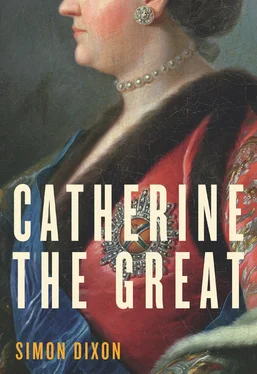There could scarcely have been a less accurate image of the married life that Peter and Catherine were to lead. Although we have only her word for what happened on their wedding night, there seems little doubt that it was a disaster. By the time she came to write her memoirs, Catherine’s growing reputation for sexual licence required her to emphasise her childlike innocence. 106Yet even allowing for a degree of special pleading, there seems no reason to think of her as anything but a virginal novice in 1745. Although sexual teasing was an integral part of life at any eighteenth-century Court, as her experiences with her Uncle Georg had shown, neither she nor Peter had been given any formal advice about ‘the difference between the sexes’ (her mother, she said, scolded her when asked) and the playful discussion she remembered with her young companions was presumably so laced with myth and folk tales as to be wholly misleading. 107When Elizabeth led the married couple to their newly prepared apartments after the dancing (in a formal procession led by the Masters of Ceremonies and the Marshal of the Court), the grand duchess’s ladies undressed her and put her to bed. She was left alone for more than two hours, ‘not knowing what I was expected to do’:
Should I get up again? Should I go to sleep? I knew nothing. Eventually, Mme Kruse, my new lady of the bedchamber, came in and announced very gaily that the grand duke was waiting for his supper, which they were about to serve. Having eaten well, His Imperial Highness went to sleep. 108
The eccentric accommodation decreed by the empress made married life no easier. Peter undressed in his apartments, but in order to reach Catherine’s, where the couple slept together, he had first to pass through rooms where his tutors were themselves preparing for bed, and then cross a vestibule at the top of a draughty staircase. Catherine suspected that these nocturnal peregrinations might have been the reason why her husband caught another fever in the spring of 1746, when he was ill for two months, causing renewed anxieties about the succession. Drawing on all her reserves of ‘natural sensitivity’, she apparently tried to broach the issue with the empress. She trod carefully all the same: ‘It always seemed to me that both of them were likely to turn on you, and I was wary of compromising myself with them.’ 109
The truth was that the more they got to know one another, the less compatible Catherine and her husband seemed. While she was intelligent, bookish and eager to learn, sustained thought proved beyond Peter’s grasp. Modern historians have gone to great lengths to show that, as a young boy in Holstein being groomed for the Swedish throne, he was exposed to an ambitious and unrelenting curriculum: French, Theology and Latin for three hours in the morning (when Latin, which he hated, eventually gave way to geometry and the study of artillery); dancing, history and geography or jurisprudence for three hours in the late afternoon. 110Nevertheless, Rulhière (the French diplomat who wrote a controversial account of Catherine’s coup) judged right in remarking that Peter’s tutors made ‘a great mistake in attempting to form their pupil after the grandest models, attending rather to his fortune than to his capacity’. 111Catherine apparently decided much the same when she first met him at Eutin in 1739: by coercing this ‘thin, delicate’ child ‘to perform as an adult’, his entourage had ‘inculcated the duplicity in his character’. 112Though nothing she says about her husband can be taken at face value, and each version of her memoirs presents a slightly different portrait, she was right about the coercion. 113As he later told his Russian tutor, Jacob Stählin, Peter had been forced to kneel on dried peas (which made it almost impossible for him to walk next day), and public floggings of up to forty strokes of the birch were inflicted with dread ceremony by a masked soldier to the beat of a drum at eight o’clock on a Saturday evening. 114By tempting him with images from historic coins and medals, Stählin managed to teach Peter to count out the names of the tsars on his fingers. Even so, the grand duke’s attention span remained dangerously short. The only academic exercises that excited his interest were those relating to military affairs. For these he had a genuine talent, based on a prodigious memory. 115But it was not enough to bring him close to Catherine. Deprived of her husband’s affections and further isolated by her debt-ridden mother’s departure on 28 September, barely a month after her wedding, she faced an uncertain future in the hostile environment of a foreign Court.
CHAPTER THREE
Living and Loving at the Court of Empress Elizabeth
1746–1753
Having been raised as an adult from a comparatively tender age, Catherine now found herself treated as a child just as she was blossoming into maturity. For nine lonely years between her wedding and the birth of her son Paul, she had to negotiate the hazards of a Court shot through with intrigue while coping with an unpredictable empress irritated by her failure to produce a male heir. It was all a far cry from the carefree life she had led at the Court of Brunswick-Wolfenbüttel.
Though Catherine had been provided with young female companions on her arrival in Moscow, it was only after her betrothal that a formal establishment was settled upon her. Peter’s household was also expanded on the occasion of the celebration of the peace with Sweden in 1744. Count Zakhar Chernyshëv, one of three gentlemen of the bedchamber appointed to the Young Court (the small entourage settled on the grand duke and duchess), was still among Catherine’s closest advisers on his death in 1785. Another, Field Marshal Alexander Golitsyn, was to lead her troops against the Turks in 1768. But if these proved to be early examples of her capacity for lifelong trust, the immediate prospects for lasting friendships looked bleak. Zakhar was soon removed when Johanna Elisabeth feared that he might be pressing his attentions on her daughter and the level of supervision over the Young Court was sharply intensified when Countess Rumyantseva was replaced as Catherine’s leading lady-in-waiting by the empress’s cousin, Maria Choglokova. 1
Only six years older than her new charge, Choglokova was appointed in May 1746 when Elizabeth, alarmed that Catherine had failed to conceive in the early months of her marriage, ordered Bestuzhev to draw up a formal instruction for the Young Court which made ‘marital relationships between both Imperial Highnesses’ a matter of state significance, second only to the formulaic acknowledgement of Catherine’s ‘true zeal’ in the Orthodox faith. 2It was widely assumed that the attractive new governess, who had grown up as a maid of honour in Elizabeth’s household in the 1730s, had been chosen in the hope that her affection for her equally uxorious spouse might serve as a model for the royal couple. 3At first, however, Catherine regarded her as ‘the most disagreeable and most capricious woman at Court’. Not that her husband was any better. However adorable he may have seemed to Maria, Nikolay Choglokov, who assumed charge of Peter’s household, struck the young grand duchess as ‘far from loveable’. ‘No man in the world was more puffed up with amour propre .’ ‘Fat, stupid, arrogant and contemptuous,’ Choglokov was ‘at least as unpleasant as his wife, which was saying something.’ Faced with the prospect of life under the surveillance of such a ghastly couple, Catherine spent much of the Court’s visit to Reval (now Tallinn) in tears and continued to be plagued by headaches and low mood on her return at the end of July. 4
It would be wrong to paint a picture of unrelieved misery. Over the winter of 1746–7, she and Peter enjoyed living in the ‘very comfortable’ Winter Palace apartments occupied by Empress Anna in the 1730s and were thrilled by the twice-weekly productions in the large theatre opposite the Kazan Church. ‘In a word, that winter was one of the happiest and best arranged that I have spent in my life. We did nothing but laugh and romp about all day long.’ 5Yet the pleasure was shattered in March 1747 by news from Zerbst of the death of Prince Christian August. Catherine had her first taste of the Romanovs’ dynastic pretensions when her grieving was cut short by the instruction that ‘it was not fitting for a grand duchess to mourn any longer for a father who was not a king’. 6More misery was to follow when Andrey Chernyshëv was packed off to Orenburg with his cousins Zathar and Ivan at the end of May. So persistent were the whispers of an attraction between him and Catherine that even her confessor was prevailed upon to ask her about it. Although she continued to write to Andrey in exile, smuggling letters out with the help of her faithful ‘oracle’, the valet Timofey Yevreinov, her friend’s departure left Catherine feeling lonelier than ever. As if to emphasise her sense of isolation, she had to undergo the indignity of a visit from the empress herself. It was the first time they had been alone together and Elizabeth took the opportunity to express her disappointment in no uncertain terms, accusing the eighteen-year-old of unfaithfulness, a charge she vehemently denied. 7
Читать дальше












